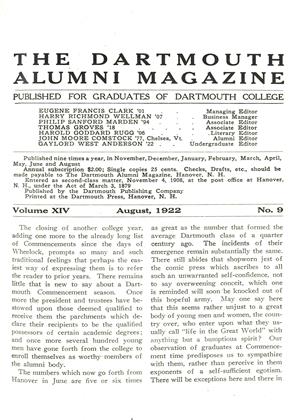In the following extract from an editorial entitled "Alumni Loyalty," which appeared in a recent number of The American School, the impressions of a Dartmouth Commencement "season are used as the basis for a plea for interest on the part of alumni of the large western state universities.
"A school man from the West was attending class day exercises at Dartmouth College last year. The great surprise to him was in the class spirit shown by the old graduates who returned for Commencement week. Generally through the West, Commencement week in college life is an incident; it does not greatly concern the old 'grads.' But at Dartmouth, our Western man found it showing the characteristics of a devotion. The maintenance of class organization and the pride of the graduates of the year in their class organizations were a revelation of college spirit, says this Western man of his Eastern trip.
Our Western friend at Dartmouth saw gray haired veterans of '5B marching in the class day parade with youngsters of the class of '64 following in the line and behind them another delegation of the class of '69; and all were marching under a blazing sun for the love of old Dartmouth and 'bright college years.' The man from the West pondered deeply on that quality of school spirit and school loyalty that will put the graduate of forty and fifty and even sixty years ago into a uniform that will give him the appearance of a cross between a Highlander and a longshoreman, and cause him to march and prance under a summer sun with the thermometer hanging about the hundred mark. Such spirit is arresting, even though Dartmouth is one hundred fifty years old.
Does the difference between the quality of loyalty shown by the old 'grads' at Dartmouth and the lack of such demonstrative loyalty on the part of the graduates of most of our Western schools indicate that there is less class spirit and less loyalty to Alma Mater, or does it indicate that less care has been taken throughout the West to keep alive this spirit of interest and loyalty and that there has been less care taken to develop the feeling of responsibility on the part of each student, as he becomes a graduate, for coming back to the old school on these occasions, and for backing up the school when occasion requires?
It is true also that the schools which have had to depend upon the loyalty, to a considerable extent, upon the financial interest and generosity of their graduates and friends, have developed a finer technique of keeping in touch with their graduates and developing in those graduates a sense of responsibility to the old school than has been the habit of those institutions which largely depend upon the state for their revenues, and who have not found it necessary to make this direct financial appeal to the alumni.
As the Westerner suggests, is there not a lesson for western institutions, and particularly for many of our state institutions, in the success old Dartmouth, and some of the other schools in that character have had in arousing and keeping up this school loyalty and school interest? It may be, as the Western school man suggests, that the kind of loyalty that would bring back an alumnus and put him into such a uniform and hold him in line in a marching column on graduation day, might also become an asset that would make him feel his responsibility for getting together his fellow graduates and donning his fighting clothes in the winter time, for a march to the State Capital for an interview which should be the occasion for some direct and forcible talk with the Cheap John legislator, who was looking for an opportunity to trim the appropriations of the school which the old grad attended to a point below that which would permit it to carry on its work in the state successfully, and to retain upon its faculty rolls the names of the able men and women who are being tempted constantly to go to other institutions that are able to offer higher pay."
 View Full Issue
View Full Issue
More From This Issue
-
 Article
ArticleCOMMENCEMENT 1922
August 1922 By PHILIP S. MARDEN '94 -
 Article
ArticleThe closing of another college
August 1922 -
 Article
ArticleTHIRTY YEARS
August 1922 By PROFESSOR JOHN KING LORD '68 -
 Article
ArticleALUMNI COUNCIL MEETS IN HANOVER
August 1922 -
 Sports
SportsBASEBALL
August 1922 -
 Class Notes
Class NotesCLASS OF 1911
August 1922 By Nathaniel G. Burleigh








